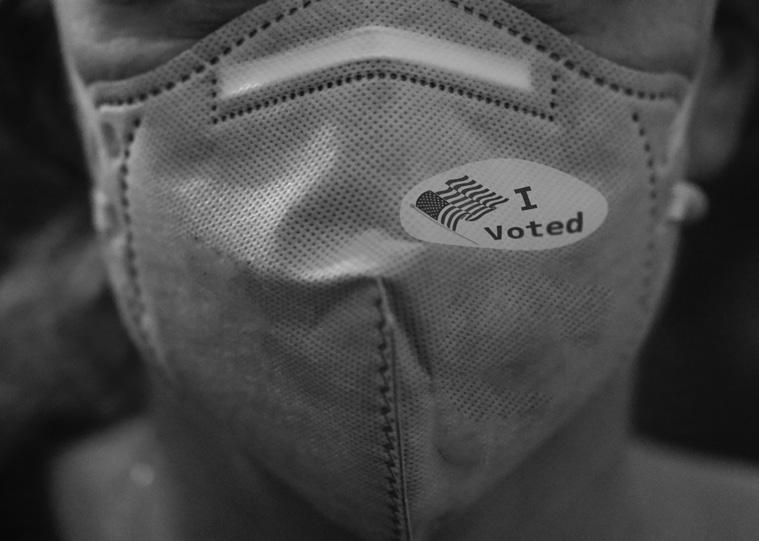a biblical view on voter fraud

kerby anderson



kerby anderson


Questions and concerns about voter fraud surface during any election year. This year the questions have intensified because many more states are proposing a voteby-mail electoral system.
The governor of California signed an executive order requiring every registered voter (including those listed as “inactive”) be mailed a ballot this November. Yet we know that Los Angeles County has
a registration rate of 112 percent of its adult population. Many of those ballots will go to addresses where the voter has moved or is deceased. Is it possible that other people at that address will use those mailed ballots?
Anyone who thinks that voter fraud is a non-issue needs to spend a few minutes looking at the Heritage Foundation database that currently lists over 1,285 proven instances of voter fraud. A link to the database is provided in the additional resources of this booklet.
The database is by no means comprehensive. It doesn’t even purport to list all the cases of voter fraud, especially when many cases aren’t investigated or prosecuted. You can find examples of false voter registrations, duplicate voting, fraudulent absentee ballots, vote buying, and illegal assistance and intimidation of voters.
If you think that voter fraud won’t impact an election, then consider that George W. Bush won the state of Florida by 537 votes. Donald Trump won Michigan by 10,704 votes. But many state and local elections are even closer. One writer collected data from over 100 elections in Ohio that were decided by less than two votes.
The latest polls show that a majority of voters (58%) favor reforming our election laws so everyone in America can vote by mail. An additional percentage (9%) back a one-time exception this year because of the pandemic.
Having the entire nation vote by mail is not a good idea, but it will take some convincing arguments to sway the current push for nationwide voting by mail. In fact, there are already five states (Colo -
rado, Hawaii, Oregon, Washington, Utah) that already conduct elections entirely by mail.
Why is voting by mail dangerous? First, the voter rolls are notoriously in bad shape. One study concluded that there are more voter registrations in 378 US counties than there are citizens of voting age in that county. Some voters have moved away. Others are registered more than once. Voters who have died are still on the rolls.
Second, universal voting by mail raises significant security questions. These ballots are the only kind that are being marked without any supervision from election officials. People can engage in election fraud. Voters might even be intimidated into voting a certain way.
Proponents of expanding mailin balloting argue that most of the
concerns being raised are hypothetical and might not even take place. We now have an example out of New Jersey that is so significant that nearly one in five ballots had to be rejected as fraudulent.
Patterson is the third-largest city in New Jersey. In their City Council election, 16,747 vote-bymail ballots were received, but only 13,557 votes were counted. More than 3,190 votes were disqualified by the board of elections. Some groups, like the NAACP, even called for the entire election to be disqualified.
Over 800 ballots were invalidated for appearing in mailboxes improperly bundled. Another 2,390 were disqualified because the signatures on them did not match the signatures on the voter records. And there were stories of people who discovered they supposedly had voted and said they never
received a ballot and did not vote.
Individuals who study elections have long concluded that voting by mail accounts for the most common type of voter fraud. The example from Patterson, New Jersey illustrates that so well. It also illustrates how voter fraud can affect very close elections. Initially, a challenger in one seat defeated an incumbent by eight votes (1,729 to 1,721).
Consider that this was just a local election, but still ended up with 3,190 fraudulent votes cast in a single county in New Jersey. You can begin to extrapolate to whole states that are pushing for mail-invoting to see the potential problem that could arise.
Voter ID
The best way to avoid voter fraud is to have in-person voting (where practical, also allowing ab -
sentee voting) and voter ID. Showing identification before voting is portrayed as an attempt at voter suppression, but states that implemented voter ID requirements provide options for someone who cannot produce a photo ID.
Actually, the argument against voter ID is difficult to make in a society that requires identification for just about everything. You need an ID to buy a cell phone. You need an ID to open a bank account. You need an ID to rent or buy a house and to apply for a mortgage. You need an ID to rent a car or even drive a car. You need an ID to get on an airplane. You need an ID to get married. You need an ID to buy a gun. You need an ID to apply for a hunting license or a fishing license. You need an ID to rent a hotel room. You need an ID to pick up some prescriptions and even to buy certain cold medications. You
need an ID to give a blood donation. You need an ID to apply for food stamps and to apply for Medicaid and Social Security. And even this is not a complete list.
When a voter ID is not needed, there is great potential for fraud. In his book, Eric Eggers gives a story of the New York City’s Department of Investigation that sent people to cast ballots on behalf of elderly citizens, felons, and people who had moved. All but two of them succeeded with no challenge or question. “One of the few unsuccessful attempts occurred when an officer attempted to vote using the name of a felon listed on the rolls, only to be informed by the poll inspector that he was requesting the ballot of the poll worker’s son.”
My favorite story comes from James O’Keefe and Project Veritas. One of his assistants decided to see if he could get the ballot for the
then-Attorney General Eric Holder. Although the Attorney General is black and was 61-years-old at the time, the poll worker was ready to give a ballot to a 20-something white kid who came in using the name Eric Holder!
One problem that has surfaced in numerous states is the problem of zombie voters. In Southern California, one investigation found that John Cenkner (who died in 2003) nevertheless voted in the 2004, 2005, 2006, 2008, and 2010 elections. His daughter told the local TV station she was astounded that this took place. Julita Abutin died in 2006. But she voted in 2008, 2010, 2012, and 2014. The county even has “signed vote-by-mail envelopes” from someone pretending to be her. That investigation alone turned
up hundreds of deceased people who voted in Southern California. More than two hundred of them voted in Los Angeles County. One woman who died in 1988 has been voting for 26 years, most recently in the 2014 election.
Voter registration is another problem. For example, a dead cat in Atlanta, Georgia was sent a voter registration form in the mail. This is not an isolated incident. One journalist has documented that, “Pets, some named Mozart and Scampers have also received voter applications in Florida, Colorado, and Washington state.”
The Georgia Secretary of State says the voter application for Cody the cat did not come from their office. Third-party groups often use mailing lists to get names and addresses. But you can imagine what the cat’s owner, Ron Tims, thought when he checked his mailbox and
found a registration card for Cody Tims.
Any person could take the voter registration application for the dead cat and fill it out with the necessary information. And when stacks of voter registration applications are dumped on the desk of local officials, they simply don’t have the time to check all the names and addresses. Whoever decides to “become” Cody Tims would then show up with a voter registration card or even ask for a mail-in ballot.
Voter fraud is a serious concern. We should demand voter integrity. When we go to the polls to vote, we shouldn’t have to worry if another person who was ineligible to vote will cancel our vote.
Eric Egger, Fraud: How the Left Plans to Steal the Next Election (Washington, DC, Regnery: 2018).
John Fund, Stealing Elections: How Voter Fraud Threatens Our Democracy (New York: Encounter Books, 2008).
John Fund and Hans von Spakovsky, Who’s Counting? How Fraudsters and Bureaucrats Put Your Vote at Risk (New York: Encounter Books, 2012).
“A Sampling of Recent Election Fraud Cases from Across the United States,” Heritage Foundation, https://www.heritage.org/ voterfraud.
